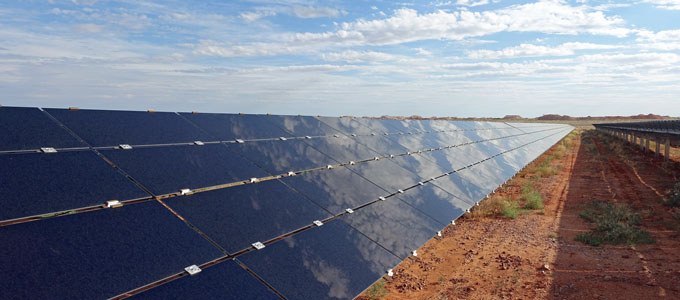Coober Pedy hybrid renewables project

Client: Energy Developments Limited
Location: Coober Pedy, South Australia
Date: 2013–2018
Powering a remote location through renewables for reliable electricity at lower cost and with lower emissions.
Background
The South Australian outback mining town of Coober Pedy has traditionally depended heavily on diesel generation. A hybrid renewable power system was desired to boost the community’s use of renewable energy, reducing dependence on costly and emissions-intensive diesel generation. This project was undertaken with funding assistance provided by the Australian Renewable Energy Agency.
Solution
The Coober Pedy hybrid renewables project allows Coober Pedy to draw on average 70% of its energy from solar and wind, with significant periods of 100% renewable operation.
The innovative project involves a hybrid combination of 4 MW wind, 1 MW solar, 1.5 MW/500 kWh battery storage, and two containerised 850 kVA flywheels and a containerised 3 MW dynamic resistor. Hydro Tasmania supplied the containerised enablers alongside an advanced hybrid control system that was key to the project’s success.
The full scope of our engagement included a study of development options and installation of wind monitoring equipment and resource assessment; preliminary system design including optimising wind and solar capacity, selecting enabling technology, and assisting with preparing the business case; containerised enabler equipment supply and factory testing; and commissioning and full system integration.
We also carried out the owner’s engineer role, developing specifications for wind, solar and battery storage, technical assessment of tender responses and witnessing factory and site acceptance testing of the battery.
Outcome
The Coober Pedy hybrid renewables project builds on the King Island Renewable Energy Integration Project (KIREIP), which led the world when it first achieved 100% renewable operation using variable wind energy in 2012.
The integrated renewable power system is performing in line with expectations, with an average renewable contribution of more than 80% in October 2017, above the predicted annual average of 70%, and Coober Pedy running fully on renewable energy for more than half of that time.



